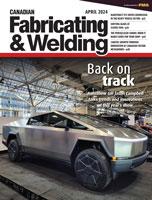Thought Leadership Communications Advisor
- FMA
- The Fabricator
- FABTECH
- Canadian Metalworking
Enhancing career and workforce resilience
Difficult challenges create opportunities for growth, inside and outside work
- By Maria Hypponen
- UPDATED May 21, 2020
- May 21, 2020
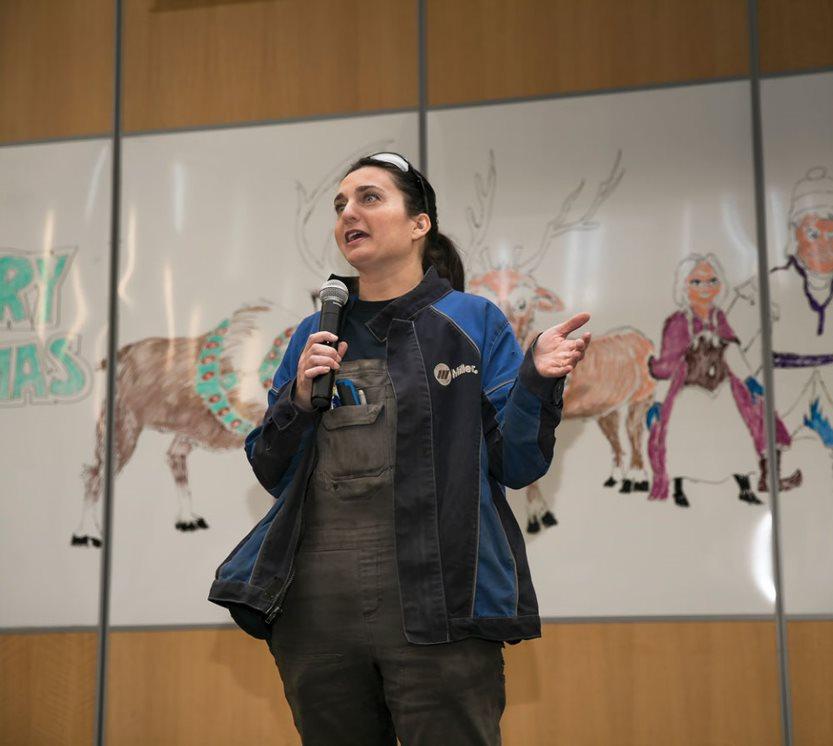
Career resilience may mean finding opportunity where you least expect it. For Nicole LeClair, that opportunity was in welding education. Here she is speaking about welding career pathways to high-school students who attended Welding Industry Day at Mohawk College’s Stoney Creek Campus in November 2019.
Welder and educator Nicole LeClair is a longtime partner of the CWB Welding Foundation. A few years ago she was facing what could have been a significant setback. She had been working for a welding distributor for more than 14 years, servicing clients for all their welding requirements. Then she heard that her company was undergoing a merger and would be making cuts.
As of the writing of this article, the world is in the grips of a pandemic. While the public health crisis rages on, we are witnessing the economic fallout: Revenues are falling, businesses are shutting their doors, and tens of thousands of people are being laid off.
For Canadians, the situation seems grim. And for LeClair, losing her job could have been devastating. But instead of being anxious about the future, she took it as a sign to reflect and take her career in a new direction.
“I had an opportunity to be packaged off and was forced to redefine myself and my career,” she recalled. “I remembered how much I enjoyed the educational aspect of my job and how much I liked teaching my clients about certain aspects of welding.” LeClair was energized by this new understanding and set out to pursue a career as an educator.
“I’ve been employed as a college welding professor for the past four years and it’s been great. I’m able to use all the knowledge I gained from my formal schooling and I get to share my love of the trade with the welders of tomorrow.”
What helped LeClair thrive after a career upset can be described as career resilience. This trait can help all of us—whether we are facing individual career challenges or as we start to rebuild after the pandemic.
Career Resilience
Resilience is described by psychologists as a person’s ability to handle change, trauma, and adversity in a positive way and come out stronger on the other side.
Career resilience, then, is the ability to respond to changing circumstances and challenges in your professional life in a way that allows you to grow and advance in your career. When you are faced with job loss, like LeClair was, career resilience is what gives you the ability to pursue new and better opportunities.
But it’s not something you can build overnight. Career resilience takes thoughtfulness, reflection, and intention. Early in his career, Cody Vigeant, a technical outreach officer for the CWB Welding Foundation, made the most of his early jobs by working hard and investing himself in his work.
“Being an invested employee meant coming in 15 minutes early and staying 15 minutes late, looking for opportunities in the jobs that nobody wanted to do, and finding someone who would be willing to act as a mentor,” he said.
Vigeant believes that career resilience comes down to flexibility and grit. “You need to make the conscious effort to be adaptable,” he said. “If you’re adaptable in tough circumstances, you’ll eventually land on your feet.”
Lifelong learning is essential for career resilience. In LeClair’s case, she set out to renew her all-position stick welding ticket, took a course through the CWB Group to become a level 1 welding inspector, and started training to achieve her Red Seal status. She also invested in other skills, such as learning how to update her resume and market herself to employers. All that investment led to a new career—one she loves.
It all starts with thinking about welding as a means to a career, not just a job, and understanding all the opportunities that exist in the trade.
LeClair agrees that this can help people build resilience. “With welding specifically, I think it's easier than some other trades to redirect and expand a career, seeing as welding has so many aspects and so many transferrable skills,” she said. “From manual welding to metallurgy, robotics, sales, supervision, and inspection, there is always another aspect to investigate and pursue.”
In addition to sharpening your technical skills through continuing education, it’s also critical to nurture your professional network. That means making meaningful connections with people in your industry. Many of those connections are made in the workplace, but welders shouldn’t limit themselves to their own shop. Attend industry events and conferences, volunteer with your association chapter, or mentor a new welder. That way, when you’re facing a bump in the road with your career, you’ll be able to find support.
Workforce Resilience
If career resilience helps individuals weather the ups and downs of their careers, workforce resilience means that employers can count on their employees to be productive and positive when the chips are down.
Sarah Watts-Rynard is chief executive officer of Polytechnics Canada and sits on the board of the CWB Welding Foundation. She believes that employers play an important role in nurturing resilience in the workforce.
“A resilient workforce is able to move at the speed of change, adapt to new requirements and new technology as required,” she said. “Resilience is a skill that someone brings with them—a comfort level with change and an ability to be adaptable as circumstances change—that can either be nurtured or discouraged in the workplace. Employers need to support continuous learning, provide training and upskilling opportunities, and ensure employees are encouraged to grow.”
Nurturing resilience in employees gives businesses the advantage in tough times. During the pandemic, businesses are retooling their lines to produce medical equipment or deploying staff to handle tasks they’ve never done before. They are counting on their employees to find alternatives and solve problems.
“Front-line workers know what’s wrong before it becomes a serious problem and are way ahead when it comes to generating new ideas and solutions,” said Watts-Rynard. “The trick is to have a workforce that is engaged well before a crisis emerges and can come at a problem as a group, brainstorm ideas and solutions, think through next steps and implement them.”
At the CWB Welding Foundation, we work with industry, schools, and government to understand which skills businesses will need over the long term. We then work with our partners in education to create programs to support the development of their future workforce. Some of our programs—such as our Mind Over Metal welding camps—provide young people with foundational skills that will put them on track to a rewarding career. Our professional development programs for educators train them to teach the next generation of welders. Other programs, including our Women of Steel – Introduction to Welding Program, give women the opportunity to explore welding and the introductory skills to succeed in the trade.
The people who participate in our programs are building skills for the long haul. They are committing to personal excellence by learning, trying new things, and making connections. They are working to understand their own strengths and how to leverage them to succeed. They are enhancing their ability to be adaptable, solve problems, and prepare for when things don’t go as planned. In short, they are building up their career resilience.
Being resilient doesn’t mean you won’t face challenges. There will be situations where you have little control. Some of those situations—like this pandemic—will require you to adapt to new ways of working, develop solutions to big problems, and possibly pivot to a new career. In the same way, businesses will have to change processes, make difficult decisions, and plan for a future that may look very different.
We are in unprecedented times. It’s the individuals who take the time to shore up their resilience, and the businesses that invest in nurturing the same in their employees, who will be most able to forge a path to recovery and prosperity.
Maria Hypponen is communications specialist at CWB Welding Foundation. She can be reached at maria.hypponen@cwbweldingfoundation.org, 800-844-6790 Ext 295.
subscribe now


Keep up to date with the latest news, events, and technology for all things metal from our pair of monthly magazines written specifically for Canadian manufacturers!
Start Your Free SubscriptionAbout the Author
- Trending Articles
Aluminum MIG welding wire upgraded with a proprietary and patented surface treatment technology

CWB Group launches full-cycle assessment and training program
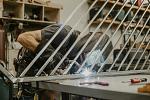
Achieving success with mechanized plasma cutting
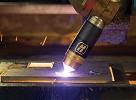
Hypertherm Associates partners with Rapyuta Robotics
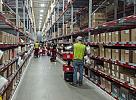
Brushless copper tubing cutter adjusts to ODs up to 2-1/8 in.
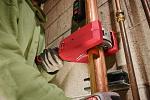
- Industry Events
MME Winnipeg
- April 30, 2024
- Winnipeg, ON Canada
CTMA Economic Uncertainty: Helping You Navigate Windsor Seminar
- April 30, 2024
- Windsor, ON Canada
CTMA Economic Uncertainty: Helping You Navigate Kitchener Seminar
- May 2, 2024
- Kitchener, ON Canada
Automate 2024
- May 6 - 9, 2024
- Chicago, IL
ANCA Open House
- May 7 - 8, 2024
- Wixom, MI













